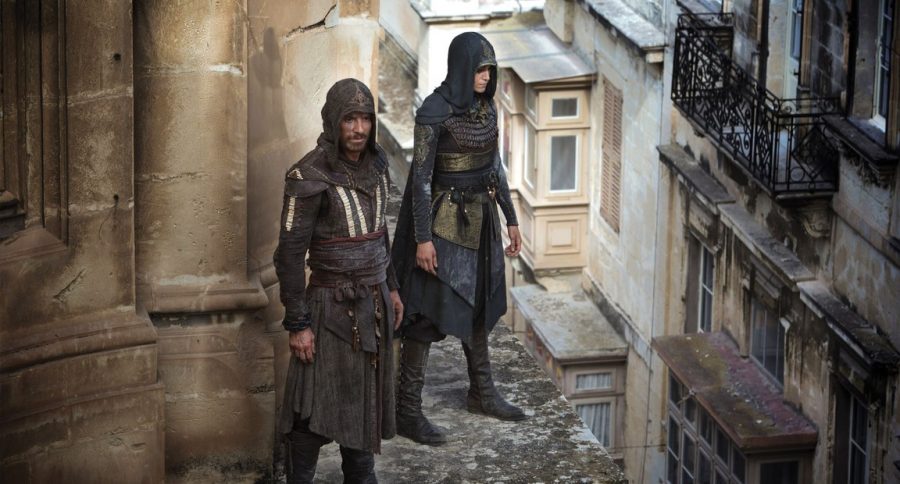Last year, I paid for a monthly subscription service called MoviePass which allowed me to see one film for free each day at the movie theater. The price was a tad steep, but I used it enough to nearly triple the value I paid for it. I saw everything, even the films that I knew would be terrible before I stepped into the theater. I sat through the entirety of the film “Nine Lives” in which Kevin Spacey plays a talking cat who is a greedy CEO and must learn how to love his family before becoming human again.
It was glorious. Seeing everything was fun and it gave me something to do, but the bad movies wore on me and eventually broke me with the last straw being “Assassin’s Creed.”
Despite my deep admiration for the lead actor, Michael Fassbender, the director, Justin Kurzel, and the video game series which the film was based on, I couldn’t bear to sit through the whole film. It was just awful. I stepped out of the theater and snuck across the hall into the theater that was showing my favorite film of last year, “Manchester by the Sea.” While Casey Affleck and Michelle Williams were delivering career best performances on the screen in front of me, my mind pondered one question, ‘Why are there no good video game films?’
I wouldn’t consider myself a devoted gamer, but I have certainly played my fair share. Time and time again I have finished games and thought that the story was tailor-made for a film adaptation. Games like “Bioshock,” “Mass Effect” and “Uncharted” had me more invested in the characters and story than most films I’ve seen, so as a film person, I immediately wanted to see those on the big screen. Yet time and time again, when Hollywood tries to adapt a video game into a film, the result ranges in quality from barely mediocre to worst-of-all-time. The only truly enjoyable video game films are ones like “House of the Dead,” “Super Mario Bros.” and “Mortal Kombat: Annihilation” that are all so terrible, they transcend repulsiveness due to their unintentional hilarity.
Diagnosing the problem with video game films seems simple at first glance: a big studio sees a big intellectual property that they can poach for a big run at the box office, so they end up cranking out a film without respecting the source material. That would make sense, yet “Assassin’s Creed” was produced by Ubisoft, the producer of the games, in order to make sure the story was respected, and that obviously didn’t solve the issue. Hollywood may have a dirty track record of disrespecting source materials, but that is only part of the problem with video game adaptations. The main problem is so simple that it gets overlooked: video games aren’t meant to be films.
That seems vague, but hear me out. Films have been successfully adapting written source material from the beginning of cinema. Novels, short stories, plays, comics and biographies are ripe for adaptation. When reading written source material, the reader forms a mental image in their mind of what the story looks like, and the job of the film adapter is to throw that image onto the film and bring it to life. It isn’t as easy as that with video games.
With a film, the audience is a viewer. With written text, the audience is a reader. With video games, however, the audience is a player with a certain level of storytelling agency. For instance, in the game “Tomb Raider,” Lara Croft is a character created and written by the creative team behind the game. She has character traits just like the characters in cinema, but as soon as the player takes control of Lara, she becomes inhabited by the player. While every person who inhabits Lara Croft via controller more than likely has a similar playing experience, it’s still a little different for everyone because they themselves become part of the character.
This aspect is ratcheted up even more in video games like “Mass Effect” and “Fallout” where the player’s choices interacting with the world can drastically change the outcome of the game’s story. This storytelling agency for the player is in part what creates the deep connection they have with the characters. By the end of a 100-hour journey with Commander Shepard in “Mass Effect,” the player is bound to feel connected with the character. This user-driven connection method doesn’t exist in the film medium yet, and that is what makes these games so hard to adapt.
Perhaps one day HBO will snag the rights to a “Mass Effect” miniseries or AMC will launch a successful “Halo” TV series and the small screen could have a go at the video game adaptation world. Perhaps the ever-developing world of VR is the missing link between the viewership of cinema and the agency of video games. But as it stands, it’s abundantly clear that the film medium is just too different from the video game medium to faithfully and successfully adapt a game to the silver screen. With the money it takes to make one of these blockbuster video game adaptation failures, there could be three or four original properties put to screen. For that reason, filmmakers should stop trying to crack the video game adaptation code and use their talents to make original stories and characters.









